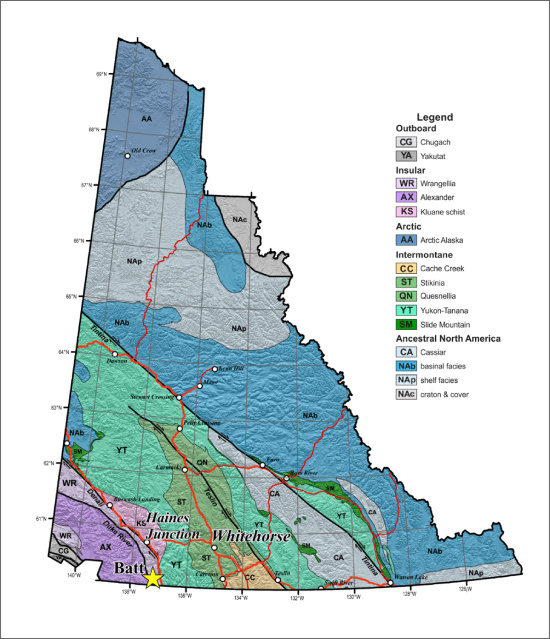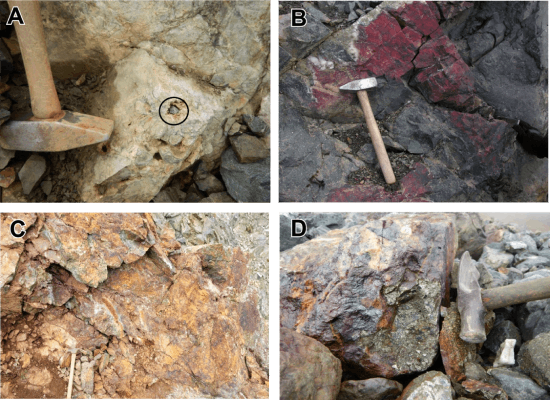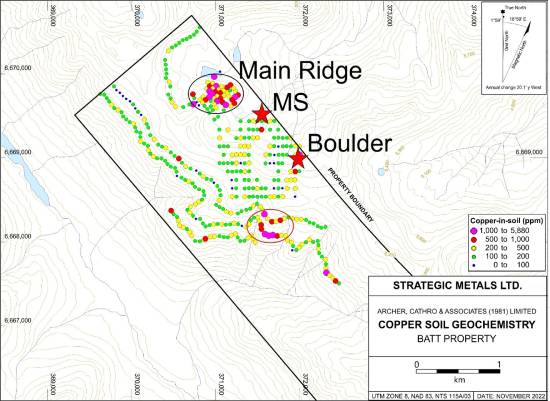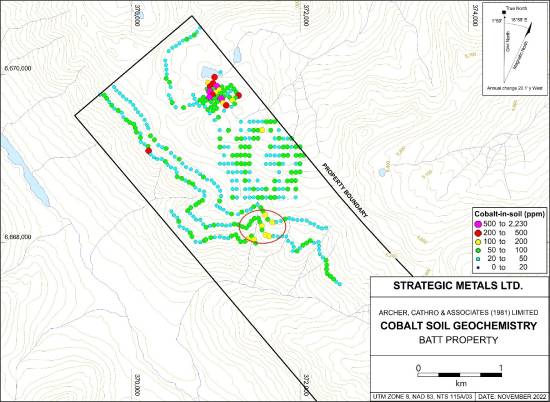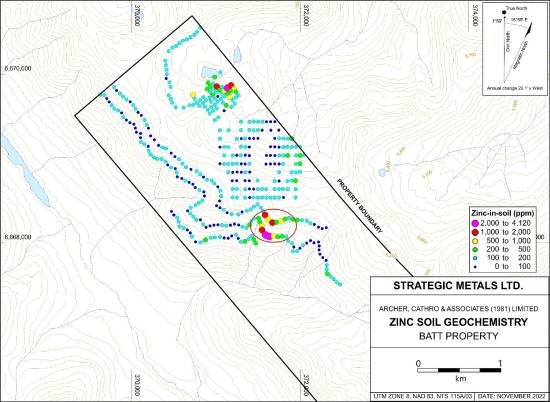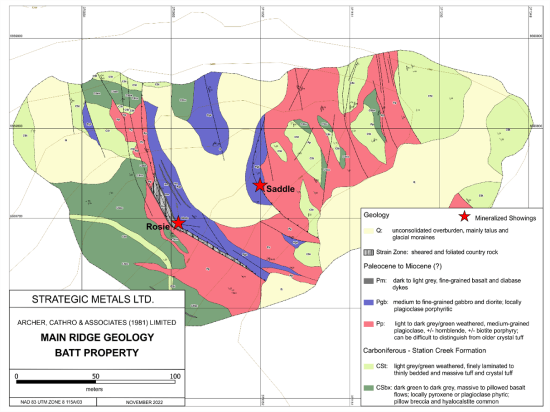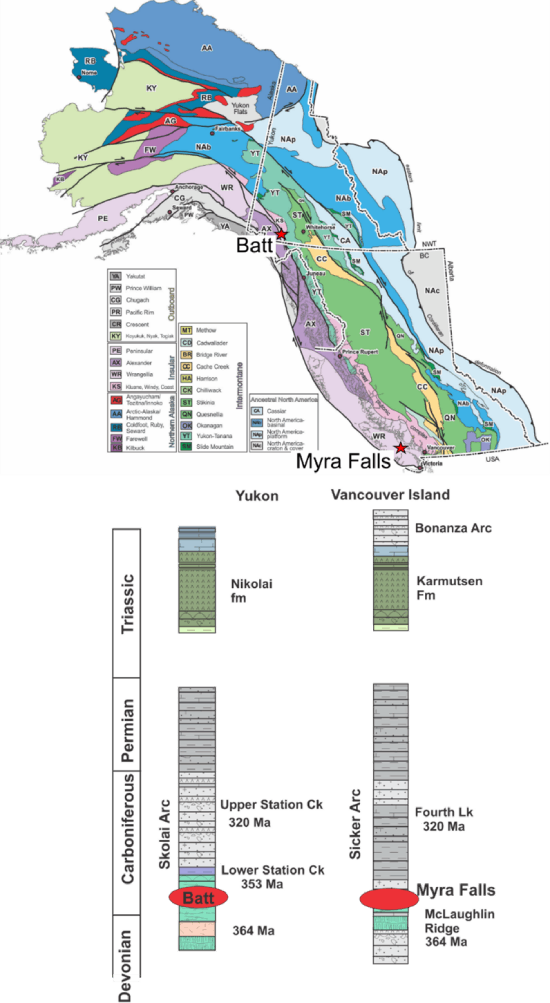Strategic Metals Reports High-Grade Copper, Cobalt and Gold Mineralization at its Batt Property, Yukon
Vancouver, B.C. – November 30, 2022 – Strategic Metals Ltd. (TSX-V:SMD) is pleased to announce results from its wholly owned Batt property, which covers volcanogenic massive sulphide (VMS) and overprinting epigenetic vein and fracture hosted, copper, cobalt, gold ± silver ± zinc mineralization.Highlights include:
- 0.71% Cu, 0.21% Co and 1.18 g/t Au over 5.7 m from a hand trench through oxidized and deformed volcanic and intrusive rocks;
- 2.18% Co and 2.37 g/t Au over 0.5 m from an outcropping shear zone;
- 8.72% Cu, 0.24% Zn, 19.9 g/t Ag and 488 ppm Co over 1 m within strongly silicified basalt with localized semi-massive to massive sulphides;
- 19.7% Cu and 41 g/t Ag from large, angular massive chalcopyrite boulder: and,
- 1.46% Co and 1.43 g/t Au over 0.5 m from a quartz-carbonate vein.
The Batt property is located about 68 km south of the town of Haines Junction in southwestern Yukon and 20 km west of the Haines Road (Figure 1).The property lies within the Traditional Territory of Champagne and Aishihik First Nations, with whom Strategic has a signed Exploration Benefits Agreement.
VMS-style mineralization has been identified at several localities on the property, hosted within a thick package of basalt containing minor intermediate to felsic tuff and volcaniclastic rocks.Geological mapping and prospecting within the northeastern part of the property have identified mineral showings and large areas of chlorite, sericite and epidote altered basalt, thick jasper/magnetite exhalite horizons and massive magnetite lenses, all of which are indicative of VMS-style mineralization (Figure 2).
At the MS zone, a 2 m thick lens of massive to semi-massive pyrite and chalcopyrite returned 1.3% Cu and 175 ppm Co over 2 m.The lens is covered by talus along strike in both directions.About 350 m to the southwest of the sulphide lens, a zone of highly silicified basalt containing a 0.5 m massive sulphide layer and stringers of sulphide was chip sampled and returned 8.72% Cu, 0.24% Zn, 488 ppm Co and 19.9 g/t Ag over 1 m.
Approximately 3.8 km to the southeast of the MS zone, a quartz-sulphide breccia and stockwork zone cutting through strongly sericite and chlorite altered basalt returned 4.01 g/t Au, 0.51% Cu and 700 ppm Co over 2 m.This zone is interpreted as representing part of a plumbing system, such as those that are typically found beneath sulphide horizons within VMS deposits.
One kilometre south-southwest of the MS zone, soil geochemical sampling has identified a 400 m by 300 m multi-element anomaly that contains values up to 0.58% Cu, 0.42% Zn and 180 ppm Co (Figures 3-5).This is a new discovery that has not yet been mapped or prospected.
Approximately 800 m southeast of the MS zone, several large (0.4 x 0.3 x 0.5 m) angular boulders of massive sulphide in float make up the Boulder zone, where a chalcopyrite, pyrite and quartz boulder returned 19.7% Cu and 41 g/t Ag, and a pyrrhotite and pyrite bearing boulder returned 0.2% Cu and 0.18% Co.By following the boulders upslope, a subcrop of semi-massive chalcopyrite and pyrite in a quartz breccia was discovered and a sample from this subcrop returned 2.2% Cu with 8.0 g/t Ag.This area has not been systematically evaluated because of thick talus cover.
Figure 1. Location of the Batt property, southwest Yukon.
Figure 2. A) Sericite altered basalt breccia with sulphide clast (black circle). B) Jasper/magnetite, quartz and epidote infill between pillows. C) Quartz-sulphide breccia and stockwork interpreted as a feeder to possible overlying VMS mineralization (4.01 g/t Au, 0.51% Cu, 700 ppm Co over 2m). D) Massive chalcopyrite and pyrite boulder from the Boulder zone (19.7% Cu and 41 g/t Ag).
Figures 3-5. Soil geochemistry from the Batt property showing multi-element geochemical anomaly (red circle).The Main Ridge, MS and Boulder zones are shown for reference.
At the Main Ridge zone epigenetic quartz and quartz-carbonate veins have been identified in brittle shears and fractures developed within the volcanic sequence and younger intrusive rocks (Figure 6).These veins host significant copper, cobalt and gold mineralization and range from 0.3 to 5 m in width.Two large structures have been identified within the Main Ridge zone, and two mineral showings, Rosie and Saddle, have been exposed in bedrock where the structures cross areas of outcrop and shallow talus.The Rosie showing is characterized by quartz and quartz-carbonate veins and associated shears, developed along a strike length of 230 m.Highlights of chip sampling along the Rosie structure includes:
- 0.44 g/t Au, 0.75% Cu and 609 ppm Co over 4.5 m;
- 1.43 g/t Au and 1.46% Co over 0.5 m;
- 3.2% Cu, and 233 ppm Co over 1.3 m;
- 0.25 g/t Au, 1.33% Cu and 145 ppm Co over 5 m; and
- 2.3 g/t Au, 0.79% Cu and 1.03% Co over 0.3 m.
A small shear zone in the hangingwall of the main Rosie structure was observed to host thin quartz-carbonate veins.Sampling across this zone returned 2.37 g/t Au and 2.18% Co over 0.5 m.
Figure 6. Generalized geology of the Main Ridge zone.
The Saddle showing is located approximately 100 m northeast of the Rosie showing and is characterized by quartz and quartz-carbonate veins developed within strongly sheared volcanic and volcaniclastic rocks over a strike-length of at least 150 m.Deformation and veining seen within the main Saddle structure ranges from 0.3 m to several meters in width.Chip sampling from a hand trench dug across the Saddle structure averaged 1.71 g/t Au, 0.35% Cu and 1375 ppm Co over 3.3 m.Another chip sample, taken 10 m upslope from the hand trench, returned 4.45 g/t Au, 0.434% Cu and 503 ppm Co over 1 m.A quartz vein developed within a shear located in the hanging wall of the Saddle structure, 50 m along strike of the hand trench, returned 4.52 g/t Au, 1.39% Cu and 673 ppm Co over 0.3 m.
A hand trench dug in the area between the Rosie and the Saddle showings revealed strongly deformed and altered gabbroic to mafic volcaniclastic rocks with thin quartz and quartz-carbonate veinlets developed along foliation.Chip sampling from this trench returned 1.18 g/t Au, 0.71% Cu and 2088 ppm Co over 5.7 m.
The sampled exposures on the Main Ridge are surrounded by talus, so the extent of the mineralization is not known at this time.
The VMS mineralization at the Batt is hosted in volcanic stratigraphy of Wrangellia and is constrained in age to Latest Devonian to Earliest Mississippian.These are the same as the tectonic setting and age for the VMS mineralization found at the Myra Falls deposits on Vancouver Island (Figure 5).
Work to date at Batt has concentrated on the Main Ridge zone and adjacent areas in the northeastern portion of the property.Volcanic stratigraphy that has the potential for hosting VMS mineralization continues to the south where a minimal amount of work has occurred.Potential for additional epigenetic copper, cobalt and gold discoveries exists throughout the property.
Figure 7.Tectonic and stratigraphic framework for the Batt property and Myra Falls VMS deposits on Vancouver Island.
Analytical work was done by ALS Minerals, with sample preparation in Whitehorse, Yukon and assays and geochemical analyses in North Vancouver, British Columbia.All rock samples were analyzed for gold by fire assay fusion and inductively coupled plasma-atomic emission spectrometry (Au-ICP21) and 48 other elements by ultra-trace four-acid digestion and inductively coupled plasma-atomic emission spectroscopy (ME-MS61).Overlimit values were determined for copper by four acid digestion and inductively coupled plasma-atomic emission spectroscopy (CuOG62).
The 2022 field program on the Batt property was managed by Archer, Cathro & Associates (1981) Limited (“Archer Cathro”).Technical information in this news release has been approved by Heather Burrell, P. Geo., a senior geologist with Archer Cathro and a qualified person for the purpose of National Instrument 43-101.
About Strategic Metals Ltd.
Strategic is a project generator with 13 royalty interests, 7 projects under option to others, and a portfolio of more than 100 wholly owned projects that are the product of over 50 years of focussed exploration and research by a team with a track record of major discoveries. Projects available for option, joint venture or sale include drill-confirmed prospects and drill-ready targets with high-grade surface showings and/or geochemical anomalies and geophysical features that resemble those at nearby deposits.
Strategic has a current cash position of approximately $5 million and large shareholdings in several active mineral exploration companies including 32.8% of Broden Mining Ltd., 34.5% of GGL Resources Corp., 31.6% of Rockhaven Resources Ltd., 19.6% of Honey Badger Silver Inc., 15.7% of Precipitate Gold Corp. and 17.2% of Silver Range Resources Ltd. All these companies are well funded and are engaged in promising exploration projects. Strategic also owns 15 million shares and 5 million warrants of Terra CO2 Technologies Holdings Inc., a private Delaware corporation which recently completed another large financing to advance its environmentally friendly, cost-effective alternative to Portland cement.
ON BEHALF OF THE BOARD
“W. Douglas Eaton”
President and Chief Executive Officer
For further information concerning Strategic or its various exploration projects please visit our website at www.strategicmetalsltd.com or contact:
|
Corporate Information Strategic Metals Ltd.
|
Investor Inquiries Richard Drechsler
|
Neither the TSX Venture Exchange nor its Regulation Services Provider (as that term is defined in the policies of the TSX Venture Exchange) accepts responsibility for the adequacy or accuracy of this release.
This news release may contain forward looking statements based on assumptions and judgments of management regarding future events or results that may prove to be inaccurate as a result of exploration and other risk factors beyond its control, and actual results may differ materially from the expected results.

